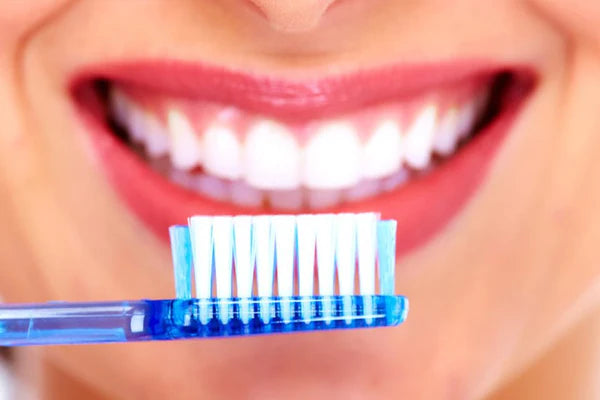Whether it's hard, soft, hot or cold food, our teeth help us every day to cut it up into portions that fit our stomachs. In order for teeth to perform this task well into old age, it is necessary to take care of them daily and keep them healthy.
When and how often should we brush our teeth?
A thorough cleaning with a toothbrush is therefore an essential act to maintain and keep your teeth healthy. There are some basic rules to follow:
- Do not forget to brush your teeth after eating: this gives you the ideal frequency at which we should brush our teeth per day. This prevents plaque from forming and ensures good oral hygiene. However, since this is not always possible when you are away from home, a soft chewing gum for the teeth can be a solution. Chewing stimulates the flow of saliva and helps remove acids formed by bacteria. Rinsing your mouth with water after eating also helps remove bacteria.
- Apply the 2X2 rule: Brush your teeth at least twice a day for two minutes each time. Ideally, brush once in the morning after breakfast and once at night before bed.
What is the proper toothbrushing technique?
When brushing your teeth, not only food residue, but also bacterial plaque must be removed. Plaque is formed by bacteria in the mouth within a few hours and is barely visible. Together with bacteria, plaque is responsible for both tooth decay and other dental problems.
To remove plaque, the toothbrush alone is often not enough, because the brush head does not always reach all areas. There will be areas left unbrushed, where tooth decay can easily form. These are often the spaces between the teeth. To ensure that these are also properly cleaned, experts recommend the use of dental floss or interdental brushes. Cleaning the spaces between teeth reduces the possibility of developing cavities, but also other mouth diseases.
However, if you don't floss or brush properly, you can injure your teeth and gums. Let your dentist show you how to use it properly if you need help. Also, you can ask your dentist for advice on which dental products are best for you.
What is the right toothbrush to use?
Good oral hygiene is more than just brushing your teeth daily and using the right brushing technique. The right toothbrush also plays an important role.
When you buy a toothbrush today, you have a wide range to choose from. There are toothbrushes with oscillating heads to short heads, toothbrushes with straight to rounded bristles, manual toothbrushes with vibration to electric toothbrushes. So, what is the right toothbrush?
When buying a toothbrush, special attention should be paid to the bristles and the head of the toothbrush.
Toothbrush bristles:
When buying a toothbrush, the "hardness" of the bristles plays an important role. This characteristic is generally divided into three categories: soft, medium or hard. If the gums are healthy, experts recommend a brush with medium-hard bristles. If the gums are diseased or sensitive, a toothbrush with hard bristles can cause bleeding gums, so it is better to choose soft bristles.
For hygienic reasons, toothbrush bristles should be made of soft plastic. Natural bristles are hollow on the inside and therefore carry bacteria.
Toothbrush head:
The ideal toothbrush has a small head of about two to three centimeters. This allows you to reach difficult areas or narrow interdental spaces.
Our advice:
To protect the toothbrush from germ deposits, it is important to rinse it thoroughly with clean water after each use and place it upside down in a holder or put a small plastic protector on it.
Also, for those who wear braces, there are special toothbrushes and accessories that help with a gentle and thorough cleaning.
How often should I change my toothbrush?
Toothbrushes have a limited lifespan that can range from a few weeks to a few months.
As soon as you notice that the bristles are separating, it should be replaced. Indeed, it will no longer be effective when brushing your teeth. In addition, it can damage your teeth and gums.
Oral health experts recommend changing your toothbrush at least every two months.



